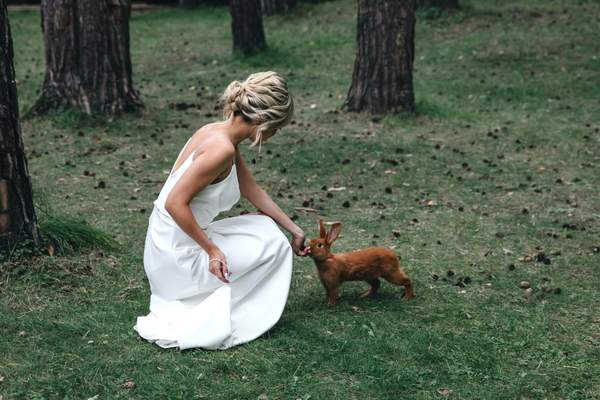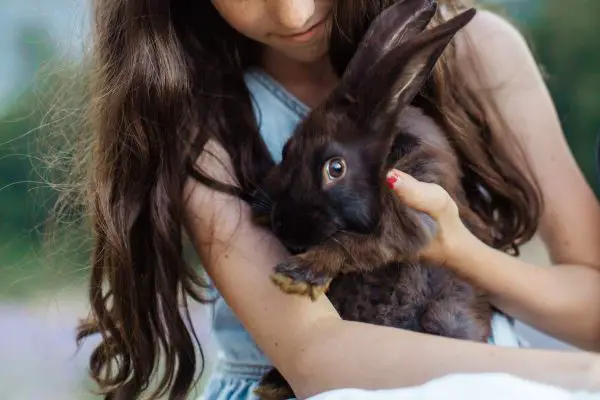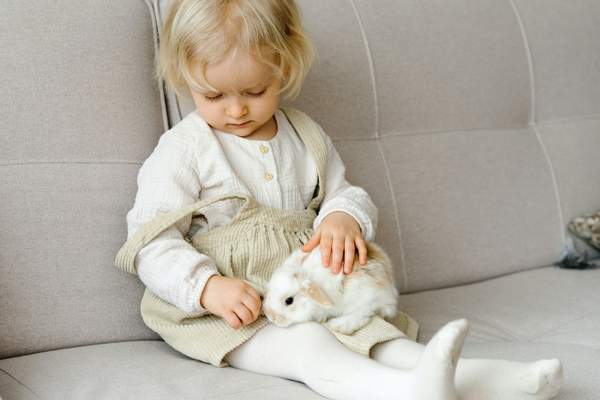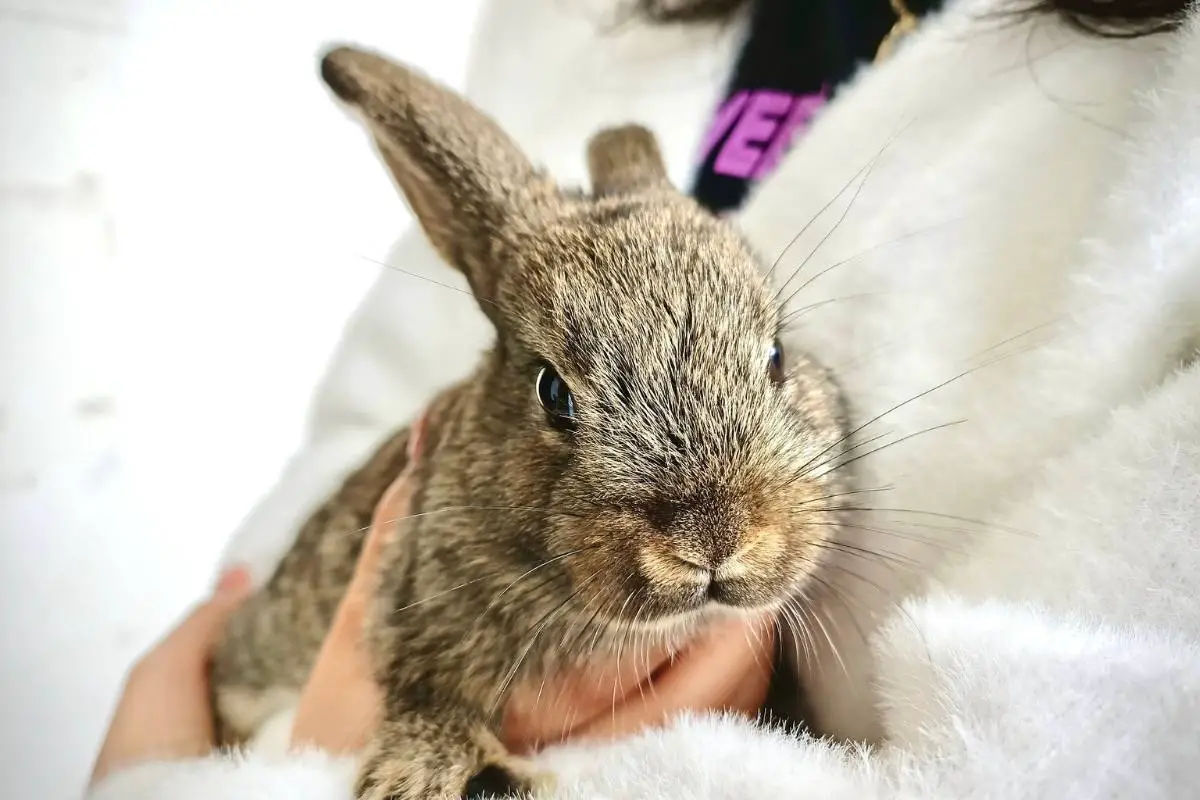Rabbits are wonderful, quirky pets who do all kinds of things that entertain us. They also do quite a few things that confuse us, such as climbing on our legs. This behavior, although strange and sometimes a bit challenging if we are trying to walk somewhere, is likely normal and nothing to fear.
So, why does my rabbit climb my leg? The most plausible answer is because your baby bunny is not such a baby anymore; your rabbit likely is entering sexual maturity and is demonstrating courting behavior.
In this article we will examine a rabbit’s body language and cues to help us understand what is going on in those little heads. We will also discuss marking, dominance, and attention-seeking, all of which could possibly play a part in your rabbit’s behavior.
Bunny Body Language and “Courting”

Rabbits depend heavily on body language to communicate with each other and with us. The difference is, however, sometimes we humans do not catch on as quickly as our pets would like.
There are a multitude of signs and signals our friends give us to let us know how they feel, and it is always a good idea for anyone with a rabbit in their home to be familiar with at least some of them.
Rabbits use everything from their noses and ears to their big back feet to communicate, so when you notice a new behavior such as leg climbing, it is a good idea to consider all surrounding circumstances.
A lot of behaviors depend on age and breed, some vary based on the time of year, and still others crop up coupled with other behaviors you may not have noticed right away like pawing or new ear positions.
Regarding leg climbing, the most likely driver of this behavior, depending on your rabbit’s age, is maturity. If you have a young rabbit that is not spayed or neutered, these antics may be part of what is referred to as “courting” behavior.
Counter to many other mammal species, this behavior is not limited to males. Both male and female rabbits demonstrate this behavior when approaching maturity. This is due to the presence of increased hormones and could appear coupled with other behavioral changes. Some additional “courting” behaviors to look for include circling your legs, pawing, grunting, or mounting.
Further, mood changes may appear in conjunction with this behavior such as sudden shows of aggression or frustration. Because this is associated with hormonal changes, negative behavioral patterns sometimes manifest that may not always go away.
Therefore, it is always in the best interest of your rabbit, both physically and emotionally, to ensure your companion is spayed or neutered.
If your adult spayed or neutered rabbit is climbing your leg, it might have less to do with changing hormones and more to do with dominance or territorial behavior.
Territorial Marking and Dominance

The exceptionally territorial and hierarchical nature of rabbits in the wild often comes as a surprise to most people. Wild rabbits live in groups called “warrens,” which consist of multiple family groups that exist within a hierarchy. Due to the nature of these large groups, rabbits can be very territorial and value their personal space quite highly.
Further, because they live in hierarchies, rabbits in the wild developed many dominance behaviors to help them establish “who’s who” in a warren. In our homes, the wild rabbits’ domestic cousins still possess a great deal of territorial and dominance instincts, which can often come as an even bigger surprise to those who are not prepared for the resulting behaviors.
Many domestic animals have one or two common methods of marking their territory with which we humans are all too familiar. Rabbits on the other hand, have several, including behaviors they may display directly toward you. Do not take it personally, however, this is just your rabbit being a rabbit.
When your rabbit climbs your leg, look for other behaviors like chinning, which is rubbing their face on you or objects in the area, spraying, or scattered droppings despite being litter-trained. When displaying these behaviors, your rabbit just wants to make it clear that you are a guest in their space.
As mentioned above, many rabbits also demonstrate inherited dominance behaviors. If your rabbit is a spayed or neutered adult and feels well-enough established in its own space that you suspect hormones or territorial marking is not driving their behavior, they could be trying to assert dominance.
This behavior probably is being driven by your rabbit’s group-living instincts, meaning it wants to establish its position over you or another person or pet in the home.
In the wild, rabbits often challenge each other for position within a warren, and the methods they use are no different than that of their house-bound descendants. In your home, look for signs such as these if you suspect dominance behavior:
- Biting
- Mounting (male or female)
- Chasing
- Grunting or growling
- “Boxing” (standing on hind legs with front paws out and swatting)
- Thumping hind legs on the ground
In addition to these behaviors, look for your rabbit bowing its head to you (demanding grooming), blocking you from giving attention to another pet, or even blocking you from entering or leaving a room.
These are all signs that your rabbit is trying to assert dominance over you to gain a higher position in your home’s hierarchy. It is not a huge problem for your rabbit to exhibit these behaviors toward you, but if there are other pets in the house, managing the relationship between the three (or four, or five) of you becomes a little more nuanced.
Therefore, it is a good idea to read up on and familiarize yourself with the politics of rabbit hierarchy with multiple pets in the home.
If none of these explanations seem to be accurate regarding your rabbit’s funny behavior, perhaps they are simply looking for some attention…or a delicious snack.
Attention (or Treat) Seeking

Due to the family-oriented nature of a warren, rabbits both in the wild and in our homes are highly social creatures who instinctively crave company. They require a great deal of socialization and attention, and of course there are times during our busy lives we might forget that for about 10 seconds.
Do not worry, however, your rabbit will remind you immediately! If your pal feels like it has been a little too long since you paid it enough attention, it might remind you by running circles around your legs while you are trying to walk (fun) or climbing up your leg.
If you believe that your rabbit’s behavior may be the result of attention-seeking, take a moment to groom, pet, or play with your companion and you will find that the behavior likely will cease. That is, of course, until the next time they want attention.
Additionally, think about the timing of your rabbit’s behavior—is it usually when you are coming out of the kitchen with a nice, big salad or some other tasty treat? If that is the case, your companion might want you to share that goodness. Rabbits have a wide array of foods that should be incorporated into their diets including fresh vegetables and the occasional fruit.
If your pal spots some berries or greens in your possession, there is every chance they will try to get you to share, which you should! Just be sure to check that what you share with them works with their delicate stomachs—contrary to popular belief, not all fruits and veggies are good for rabbits, including the infamous carrot!
Some safe and nutritious choices for your companion include bell peppers, cucumbers, leafy greens such as romaine lettuce or mustard greens, and fruit in moderation such as berries or apples.
If you have read this far and still are not convinced that any of these things are compelling your companion to scale your legs, one more possibility is that your bunny is simply overjoyed to see you!
Doing a Happy Dance
As you probably know by now, rabbits have quite a lot of personality packed into a small package. You also know that rabbits primarily use body language to communicate how they feel, which includes when they are feeling joy. Being the social creatures that they are, the presence of one of their warren-mates, rabbit or human, after any absence likely makes them very happy.
To express their exuberance at your return, they may run circles around your feet (like when they want something), jump or climb on you, and nudge your hands for petting. They may also end up racing around the room as fast as they can.
One of the most endearing things our friends do to demonstrate their happiness is jumping into the air and twisting, sometimes called a “binky,” repeatedly, unable to contain their joy. Knowing your bunny’s quirks and habits such as these will go a long way in determining what is driving its behavior.
Conclusion
If your young, intact rabbit has suddenly started displaying behavior like climbing your leg, circling, pawing, or mounting, chances are they are entering sexual maturity and are demonstrating “courting” behavior. Now is a good time to contact your veterinarian to have your pet spayed or neutered.
If you have an adult spayed or neutered rabbit who is demonstrating this behavior, they could be marking territory or asserting dominance. Further, your rabbit may want attention or treats, or it could simply be overjoyed at your company. Regardless of what is driving this behavior, it is most likely no cause for concern, your rabbit is doing what it does best—being a rabbit!

